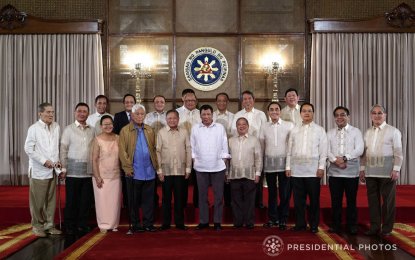News
Con-com votes to regulate political dynasties

The voting took place at the Philippine International Convention Center (PICC) in Pasay City, where Con-com members decided to regulate political dynasties in the new charter instead of banning them. (PNA photo)
MANILA — President Rodrigo R. Duterte’s Consultative Committee (Con-com), tasked to review the 1987 Constitution, voted on Monday to prohibit the succession of an incumbent official’s relatives, up to the second degree of consaguinity and affinity, from the presidential position down to the barangay level.
The voting took place at the Philippine International Convention Center (PICC) in Pasay City, where Con-com members decided to regulate political dynasties in the new charter instead of banning them.
An earlier version of this article said the Con-com recommended to prohibit relatives up to the second degree from holding or running for multiple simultaneous positions at the national, regional (or constituent state), local and barangay levels.
This story has been revised to reflect that the committee voted to prohibit succession by a second-degree relative for all positions from president down to barangay.
This means that parents, in-laws, children, grandparents, and grandchildren of an incumbent official will be prohibited from holding or running for positions.
The prohibition on running for or holding multiple positions was deferred for further discussion on Tuesday.
There were 19 out of the 20 Con-com members present with only Father Ranhilio Aquino absent during the voting.
The Con-com members first voted between banning or regulating political dynasties, where 10 members voted to regulate political dynasties while nine members voted for a total ban.
Afterwards, the Con-com decided whether regulation should cover relatives until the second, third or fourth degree of consanguinity or affinity.
Nine voted to regulate relatives until the second degree, only one voted until third degree, and nine until fourth degree.
A run-off vote was hence conducted, where Con-com member Virgilio Bautista changed his vote to regulate until the third degree to regulate until the second degree.
Con-com member and former Senate President Aquilino “Nene” Pimentel Jr. earlier pushed for a total ban saying regulating would only allow loopholes.
“If it is only regulated, there would be loopholes in the very idea of stopping political dynasties,” Pimentel said.
Con-com member and De La Salle University Political Science Professor Julio Teehankee said total ban could be risky as there might not be any qualified candidates left to run.
“We are not banning political families because that goes against choice to suffrage, what we are saying is give chance to others,” Teehankee said.
“Our recommendation is to regulate, to balance both the need to address the monopoly but at the same time address other issues of access, democratic principle and even political recruitment,” he added.





















